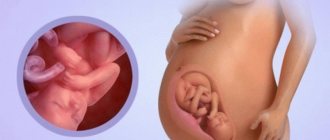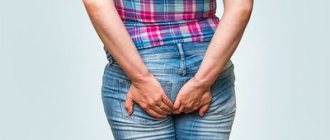Physiological changes that occur in a woman’s body during pregnancy affect almost all organs and systems. Most of them are aimed at the successful pregnancy and birth of a child. But some have a negative effect on the expectant mother’s body, causing an exacerbation of chronic pathology or the emergence of new diseases. Such unpleasant consequences of pregnancy include hemorrhoids.
The appearance of symptoms of this disease during pregnancy raises a lot of questions in a woman about the possibility of giving birth with hemorrhoids: will she be able to give birth on her own, what complications and consequences may there be? Doctors in most cases approve of the natural course of childbirth, but still this issue is resolved individually, depending on the severity of the disease.
What are hemorrhoids, and what are they like?
Hemorrhoids are a disease of the vascular system of the blood supply to the rectum and are characterized by varicose hemorrhoidal veins. It is through these veins that blood flows from the lower parts of the rectum. As a result of prolonged stagnation of blood, changes occur in them; the veins wriggle, representing pineal-shaped protrusions of the skin around the anus or rectal mucosa.
Based on localization, hemorrhoids are classified as follows:
- To external, in which the nodes are located outside the anus and are visualized during a routine examination. They can also be seen by the patient himself.
- Internal, in which hemorrhoidal protrusions are located above the anal ring, that is, inside the lower parts of the rectum.
According to statistics, every fifth person faces the problem of hemorrhoids.
Depending on the nature of the course, the following types of this disease are distinguished:
- acute – characterized by pronounced symptoms in the form of severe pain and inflammation;
- chronic - with it there is an alternation of symptoms of exacerbation with periods of remission.
There are also several stages of the disease, which, if left untreated, progress to the next, more advanced stage.
When is a caesarean section performed?
Hemorrhoids in themselves are not a reason for a cesarean section, but certain circumstances may make a natural birth impossible. Surgical intervention is recommended in the following cases:
- fourth stage of varicose hemorrhoidal veins;
- addition of a bacterial infection;
- thrombosis of hemorrhoids;
- necrosis;
- prolonged and heavy bleeding.
Caesarean section minimizes the load on the organs and muscles of the pelvis. Thanks to this, the likelihood of an exacerbation is minimized. However, surgery is not a guarantee against complications of hemorrhoids.
After surgery, women move little, which can cause congestion and problems with stool. It is worth remembering that a caesarean section is a last resort and should be avoided. It's better to give birth yourself!
If hemorrhoids appeared after a caesarean section, it is necessary to take a position in which the lower part of the body would be higher. This will eliminate congestion and normalize blood flow. As for laxatives, it is important to choose those that would not harm the baby when feeding.
For severe constipation, enemas based on a decoction of medicinal herbs are useful. For these purposes, you can use chamomile, calendula or yarrow. After canceling bed rest, you should return to physical activity, gradually increasing the load.
Physical activity will help reduce the risk of complications during childbirth
If a woman has acute inflammation, which is accompanied by pain, burning, and bleeding, drug treatment will most likely be needed. To relieve the inflammatory process and reduce vascular permeability, drugs such as Troxerutin or Troxevasin are used. To thin the blood and improve vascular tone, Doxium or Aescusan is used. Venitan and Misvengal fight pain, burning and itching well.
Cool baths using infusions of chamomile, nettle or dandelion will also help relieve pain and relieve inflammation. Alternative medicine also offers lotions using grated potatoes or beets.
Causes of hemorrhoids during pregnancy
The following factors contribute to the occurrence of hemorrhoids during pregnancy:
- Physiological increase in progesterone levels in the body. This hormone is indispensable for the normal course of the intrauterine period of the fetus. At the same time, it has the property of reducing vascular tone, including the venous plexuses. The veins of the lower parts of the rectum dilate and protrude in the form of hemorrhoids. As pregnancy progresses, the level of the hormone increases, and accordingly, the appearance of hemorrhoids before childbirth is typical.
- The growth of the uterus and fetus as a factor of pressure in the pelvis and abdominal cavity. As pregnancy progresses, the uterus puts increasing pressure on the pelvic veins, which collect blood from the genitals and rectum. Thus, favorable conditions are created for disruption of the outflow of venous blood from the rectal veins and hemorrhoids form before childbirth.
- Slowing of lower gastrointestinal motility due to hormonal changes. Under these conditions, there is a predisposition to constipation. Prolonged overflow of the rectum with feces contributes to venous stagnation. In addition, with constipation, a pregnant woman is forced to strain intensely during bowel movements, which also contributes to the formation of nodes in the hemorrhoidal veins.
- Physical inactivity and weakness of the pelvic floor muscles. Many expectant mothers lead a passive lifestyle during pregnancy. For some women, such a sedentary regime is associated with pregnancy complications (preeclampsia, threat of miscarriage or premature birth). Some are simply lazy, citing fatigue. All this leads to impaired blood circulation in the pelvic organs and contributes to the development of hemorrhoids before childbirth.
Attention! If the disease was identified before pregnancy, then during pregnancy the condition may worsen, and there is a high probability of new nodes appearing.
Surgeries to remove hemorrhoids in pregnant women in our clinic
The department has the technical equipment to perform all types of surgical intervention for hemorrhoidal disease, ranging from latex ligation to ultrasonic removal of hemorrhoids.
- Ligation of hemorrhoids. This method is used to treat internal hemorrhoids, when the manifestations of hemorrhoids include prolapse of self-reducing hemorrhoids and moderate bleeding during bowel movements. The essence of the method is that a small latex ring is placed on the hemorrhoidal node, which compresses its base with the vessels passing through it, stopping the blood flow in the node. After several days, the knot and the ring fall off, and the resulting wound heals within 1-2 weeks. This procedure is most often virtually painless.
- Sclerotherapy and infrared photocoagulation. These methods are suitable for the treatment of hemorrhoidal disease, manifested only by bleeding without prolapse of nodes.
- Hemorrhoidectomy is a surgical operation aimed at removing hemorrhoids. This is the best way to achieve complete disappearance of all symptoms. Surgical removal of internal hemorrhoids is used for prolapsed and non-reducible nodes, or when the effect of outpatient treatment is not observed, or when outpatient treatment is impossible. During surgery, excess tissue that is a source of bleeding is removed. To make the patient more comfortable, the operation is performed under spinal anesthesia with sedation.
Photo of hemorrhoids in a pregnant woman BEFORE
Photo of hemorrhoids in a pregnant woman AFTER
Taking into account the conducted research, standards for the management of patients with hemorrhoids during pregnancy and lactation have been developed, allowing for the safest possible surgical intervention and ensuring adequate postoperative pain relief. The Clinic of Coloproctology and Minimally Invasive Surgery is located in the same institution as the Clinic of Obstetrics and Gynecology. This allows us to monitor patients after surgical treatment together with gynecologists.
You should always remember that pregnancy is a special condition that requires careful monitoring and an individual approach. Therefore, even drug treatment and regime correction require consultation with a qualified specialist.
Why do hemorrhoids appear during childbirth?
During the natural course of labor, a woman’s body will have to withstand a colossal load. During contractions, the muscle fibers of the uterus contract, helping the fetus move through the birth canal. This leads to an increase in pressure in the abdominal cavity and pelvis and difficulty in the outflow of blood from the veins, including hemorrhoids. Their varicose veins appear.
Increased pressure on the pelvic organs during childbirth impairs their blood circulation and contributes to the development of hemorrhoids
In the second stage of labor, pushing is added to the contractions - contractions of the abdominal muscles, increasing the pressure on the fetus several times more. In addition, the baby's head, moving through the mother's reproductive tract, mechanically compresses the venous vessels. This contributes to the appearance of hemorrhoids during childbirth.
Postpartum activities
Treatment of hemorrhoids after childbirth is carried out in two ways. The first method is based on conservative therapy, the second method is surgical treatment. It all depends on how the disease progresses. You should not be afraid of surgical treatment, since modern techniques such as sclerotherapy, infrared coagulation and latex ligation of nodes are low-traumatic interventions that guarantee a successful recovery.
It is not recommended to diagnose yourself and treat hemorrhoids at home without the participation of a doctor. If the problem is detected early, treatment is faster and more effective.
There are many effective drugs aimed at treating this pathology. Therefore, childbirth and hemorrhoids, when combined, are not currently a serious problem. The main thing is to promptly consult a doctor for help if signs of disease development are detected.
Author: Olga Rogozhkina, doctor, especially for Mama66.ru
Possibility of natural childbirth
Hemorrhoids are not a contraindication to spontaneous childbirth, but they can affect their course to varying degrees. The disease can significantly lengthen the labor period. Also, this process can be more painful for the woman in labor.
Attention! The act of birth itself can provoke an exacerbation of hemorrhoids.
Sometimes, when the fetal head erupts and the anus expands, internal nodes may fall out of the rectum. The main thing here is the prompt reaction of obstetricians, who must quickly move the formation inside before the anal ring closes. This will prevent strangulation of hemorrhoids.
Proper preparation of the woman plays a decisive role in the birth process
A pregnant woman should know how to avoid hemorrhoids during childbirth. To do this, you need to listen to the midwife, do not overstrain the pelvic floor muscles, push only when the doctor says, and breathe correctly.
Natural birth process
Hemorrhoids and natural childbirth are completely compatible processes, despite the possible risk for the mother. Why do medical workers prefer to choose independent labor? There are two reasons for this:
- Caesarean procedure involves the use of anesthesia, which does not always have a beneficial effect on the child. That is, natural childbirth is still safer for newborns.
- After the birth process planned by nature, the female uterus is more likely to recover than after surgery.
However, inflammation of the hemorrhoids can significantly complicate the birth process, increasing its duration and severity of pain.
Since during natural labor the load on the pelvic muscles increases, the anus area is also affected.
In this case, not just an exacerbation of the pathological process may occur, but hemorrhoidal cones may fall out and become pinched. The nodes that fall out due to excessive pushing become pinched due to the rapid “slamming” of the anal valve after the birth of the child.
The nodules are not able to move into the rectum on their own. And if doctors don’t have time to return them to their place, they get pinched. This condition is accompanied by severe pain, however, according to those women who gave birth with hemorrhoids, it happens extremely rarely.
Hemorrhoids and natural childbirth are completely compatible processes, despite the possible risk for the mother.
If women in labor follow all the obstetrician’s recommendations during contractions and pushing, it will be possible to give birth with hemorrhoids naturally without negative consequences in the form of anal fissures, ruptures, and aggravation of the pathological process.
Contraindications for vaginal delivery
However, only an obstetrician-gynecologist can tell you how best to give birth to a woman with hemorrhoids after consulting a proctologist. There are a number of situations in which the choice is made in favor of a cesarean section:
- Stage IV of the disease;
- infection of nodes;
- thrombosis of the hemorrhoid;
- severe frequent rectal bleeding.
When performing operative delivery, the load on the pelvic organs and pelvic floor muscles is eliminated, which is preferable in case of severe hemorrhoids. But this does not mean that women who gave birth by cesarean section do not have factors in the postoperative period that contribute to the appearance or exacerbation of hemorrhoids.
Forced bed rest, intestinal atony after surgery, which contributes to the development of constipation, stagnation of blood in the pelvis - all these factors negatively affect the condition of hemorrhoidal veins. Therefore, early activation of the woman in the postoperative period and an elevated position of the pelvis for the outflow of blood from the veins are so important.
Increasing physical activity during pregnancy is an excellent way to prevent hemorrhoids
How to cure hemorrhoids in pregnant women
The main difficulty in treating hemorrhoids in women during pregnancy and after childbirth is choosing drugs that can most effectively cope with the symptoms and are safe for the woman and child.
The pharmaceutical market offers a wide range of effective drugs with different trade names, many of them are made from natural substances and are safe for pregnant and lactating women. However, before prescribing any drug, consultation with a doctor is necessary to discuss the advisability of its use, the risk-benefit ratio and obtain recommendations.
Conservative (medicinal, non-surgical) methods often do not cure hemorrhoids, but only temporarily relieve unpleasant symptoms.
However, in some cases (ineffectiveness of conservative therapy, stage III-IV hemorrhoids, thrombosis of the hemorrhoid, complicated course, subjective complaints and patient desire), surgical treatment is necessary. Currently, there are minimally invasive techniques, low-traumatic methods that can relieve the disease for a long period of time without the need for the use of strong analgesics.
Until recently, pregnancy was a relative contraindication to surgical removal of hemorrhoids. This is primarily due to the need to use anesthesia during surgery, as well as prescribe painkillers. As is known, many medications are not recommended for use during pregnancy and lactation due to a possible toxic effect on the developing body of the child.
Our clinic provides both conservative and surgical treatment of hemorrhoids in pregnant women. If the task is to cure external hemorrhoids, the matter is often limited to drug therapy. For internal hemorrhoids, surgical methods are used.
Prevention of hemorrhoids and their exacerbations during pregnancy
Maintaining a healthy active lifestyle is the most effective method of preventing hemorrhoids and its exacerbations, which in the long term allows a woman to give birth without any special proctological problems. In addition, you need to follow a few more rules:
- Does not sit for a long time.
- Carefully monitor the hygiene of the genitals, anus, and perineum.
- Achieve regular soft stools with a diet that includes a sufficient amount of fiber (fresh vegetables, fruits, prunes, bran bread) and dairy products. If constipation cannot be corrected with diet alone, you can use medications to normalize stool.
- Inadmissibility of strong straining during the act of defecation.
- Daily physical activity in the form of walking, swimming, yoga for pregnant women.
- Perform a set of exercises daily to strengthen the pelvic muscles. This method helps not only to facilitate labor and avoid ruptures, but also helps to empty the veins of the rectum.
- Regular adoption by a woman of the knee-elbow position starting from 20 weeks of pregnancy. In this position, the uterus does not cause compression of the main venous vessels and blood flows freely from the venous plexuses. This serves as an excellent prevention of hemorrhoids, which are so difficult to get rid of during pregnancy.
Reference! Lactulose-based laxatives are allowed during pregnancy, but you should still discuss this issue with your doctor before taking them.
In addition, you need to be regularly examined by a proctologist to monitor pathology. Perhaps he will prescribe a course of phlebotropic drugs that will increase venous tone and strengthen the vascular wall.
Venotonics strengthen the wall of hemorrhoidal veins and reduce the manifestations of hemorrhoids
Risk groups for developing hemorrhoidal disease
Thus, as we have already understood, everyone has a risk of developing hemorrhoids. Who has it more? Yes, most people already know:
- If parents have hemorrhoids, heredity plays a big role;
- If there is constipation, strong straining during bowel movements and prolonged sitting on the toilet contribute to a more rapid expansion of the hemorrhoidal plexuses and the formation of hemorrhoids;
- If you have to sit for a long time at your workplace, the outflow of blood from the hemorrhoidal plexuses is disrupted (office workers, drivers);
- During pregnancy, the outflow of blood from the hemorrhoidal plexuses is disrupted due to an enlarged uterus and compression of the pelvic veins.
When several factors combine, the disease develops faster and earlier.
What to do, what to do? Is everything really lost? How to live further? To suffer like mother, grandmother and further back in time? Judging by women's forums (for example, rebenok.by) - many want to suffer and actually suffer. There is no limit to human ignorance and stupidity when it comes to health in general and hemorrhoids in particular! Did you shove potato candles into your butt? Did you add baked onions? Did you sit over hot bricks? And did they introduce suppositories made of ice? Does not help? Oh no no no! And stick the cucumber in the garden up your butt! What also doesn't help? Maybe zucchini will help?
Funny? Stupid? Some are stupid and funny, and some are noisy! Have you read the beginning of the article? Where will the dilation of the veins of the hemorrhoidal plexus go after sticking a cucumber in the butt? Right! It's not going anywhere!
Planning pregnancy in the presence of hemorrhoids
Experts strongly recommend that a woman planning to become a mother be examined for chronic diseases and treated for them before pregnancy. This also applies to hemorrhoids.
It should be remembered that hemorrhoids cannot be completely cured with conservative methods.
Consulting a proctologist at the pregnancy planning stage will help you understand the seriousness of the problem. The doctor will tell you what needs to be done and determine treatment tactics.
In addition to medicinal methods, in the form of a tablet course of venotonics, suppositories and ointments, the doctor in more advanced cases may recommend surgical treatment. You should not abandon this method of solving the problem, because now low-traumatic techniques are used (laser coagulation, sclerotherapy, ligation with latex rings and others). In addition, surgical treatment can radically get rid of this disease.
Content
- Causes of inflammation of hemorrhoids
- Risk groups for developing hemorrhoidal disease
- Hemorrhoids when planning pregnancy
Dear readers - patients and (first of all) female patients!
It’s not for nothing that we put this article on the main page of our website. The topic of pregnancy and hemorrhoids is always relevant. It also applies to those women who are about to go through this stage of life and those who are already successfully raising children. And many husbands take an active part in the health of their wife (their family).
Therapeutic measures during pregnancy
The penetration of drugs through the hematoplacental barrier limits the arsenal of drugs to combat hemorrhoids during pregnancy.
Important! It is strictly forbidden for a pregnant woman to take any medications for the treatment of hemorrhoids without prior medical consultation!
In addition to general regimen and dietary recommendations, the disease can be treated with the help of suppositories of plant origin (Sea buckthorn oil). The following safe folk methods are also allowed:
- washing the perineum with decoctions of chamomile, nettle and lotions based on them;
- lotions for the anal area from fresh potatoes and beets, crushed with a grater.
Intensive treatment of hemorrhoids before childbirth is also carried out in case of acute symptoms (severe pain, bleeding, burning) with the help of safe medications (Troxevasin, Aescusan, Venitan).
Treatment of hemorrhoids during pregnancy
If signs of hemorrhoids appear during pregnancy, what should you do first? The main condition for proper treatment is regular bowel movements. This will be facilitated by a special diet high in plant fiber: vegetables (cabbage, beets), fruits, herbs, as well as cereals, especially buckwheat. It is forbidden to eat spicy food, smoked meats, or dishes with spices.
Depending on the condition of the pregnant woman, walking and therapeutic exercises are recommended. After each bowel movement, you need to wash the anus with cold water. For first aid for severe pain, suppositories with lidocaine, novocaine, for example, the drug anestezol are prescribed. Venitan gel contains natural extract of horse chestnut fruit. This drug is recommended for use without restrictions. It improves blood circulation, increases the strength of blood vessels, relieves swelling and pain.
In the acute stage of the disease, a woman is indicated for hospitalization and treatment of hemorrhoids in a hospital. Local remedies for hemorrhoids during pregnancy: heparin, butadione ointments, troxevasin-gel, hepatrombin-g, proctoglivenol. Oral medications are used only as prescribed by a doctor, as they have contraindications.
Conservative treatment of inflammation of hemorrhoids is carried out comprehensively. It is necessary to relieve pain, improve bowel movements, improve blood circulation, and strengthen the walls of blood vessels. For pregnant women, medications should be prescribed by a doctor to avoid unwanted effects.
Reviews about childbirth with hemorrhoids
Anya: I got hemorrhoids at 37 weeks of pregnancy. It didn't cause me any particular discomfort, just a little itching. The gynecologist said that my hemorrhoidal node had “popped out”. Since I was very nervous, she hastened to reassure me that this would not interfere with the birth. This was my first birth, but everything went well. Of course, it was painful, but the nodule had nothing to do with it and it practically did not increase after childbirth.
Masha: After my first pregnancy and childbirth, I faced the problem of hemorrhoids. Sometimes I felt itching and pain when going to the toilet. When I became pregnant for the second time, the node became larger. I consulted with a proctologist, who advised me to do exercises to strengthen the pelvic muscles, and until the end of pregnancy, the hemorrhoids no longer enlarged. The birth took place without complications.
Thus, even such an unpleasant disease as hemorrhoids, in most cases, cannot prevent a woman from becoming a mother. For the normal course of pregnancy and childbirth, a woman needs to monitor her health and consult a proctologist in time before giving birth.
Symptoms
Bleeding after bowel movements is one of the main symptoms of hemorrhoids. Blood loss can range from blood on toilet paper to severe bleeding requiring emergency treatment. The disease is also characterized by the presence of itching, burning and discomfort in the anal area. Pain does not occur in all cases; usually pain during bowel movements and at rest appears only at the stage of exacerbation of the disease.
Prolapse of hemorrhoids is the second striking symptom of hemorrhoids. At the initial stage of the disease, the nodules come out of the anal sphincter along with the stool; you can straighten them yourself. Later, the nodes have to be adjusted more and more often, because as the pathology progresses, the muscle tone of the sphincter weakens and cannot hold the nodes in the rectum for a long time.
Hemorrhoids, like any other disease, occur in acute and chronic forms. In the first case, the pathology is accompanied by sharp pain, in particular during defecation, while walking and even with slight physical activity.
The chronic form of hemorrhoids is characterized by minor pain in the anus, often appearing during bowel movements and disappearing after it, light and rare bleeding after stool and periodic prolapse of hemorrhoids.







